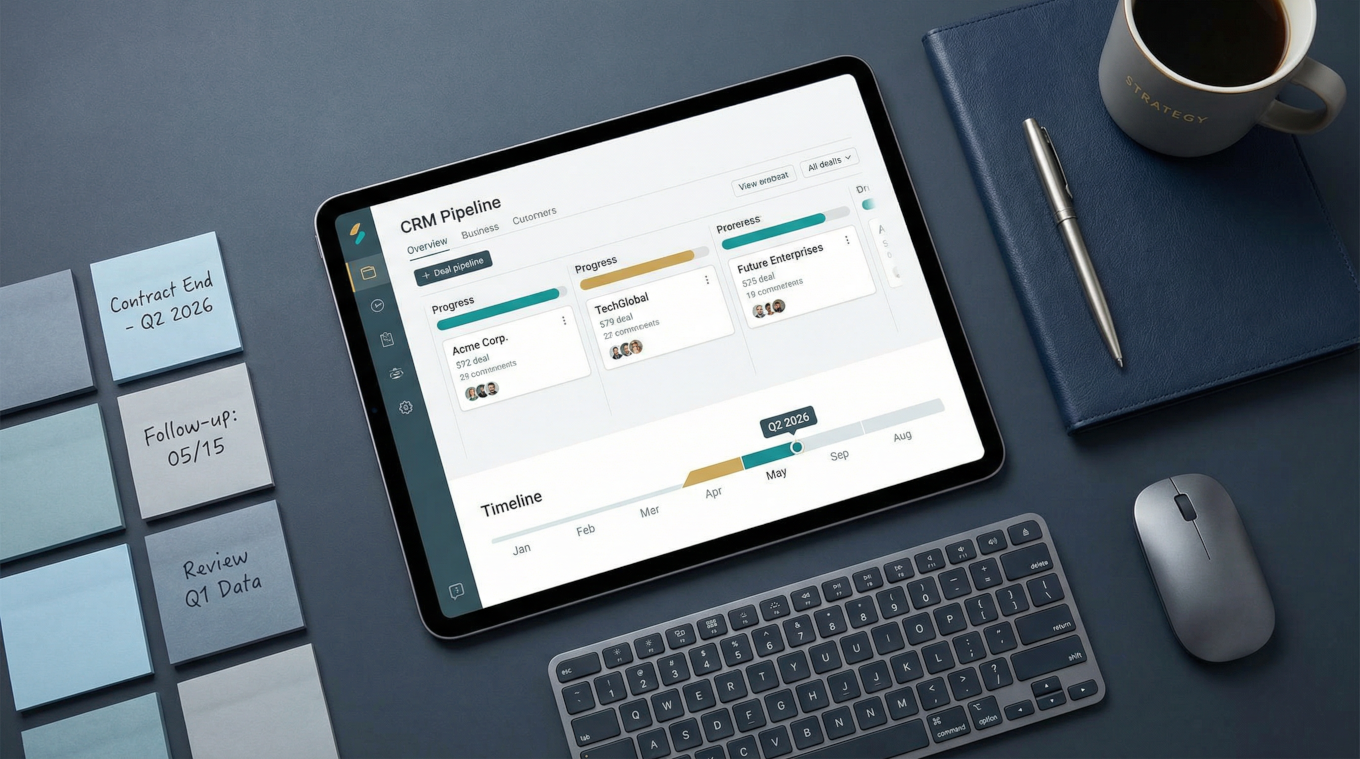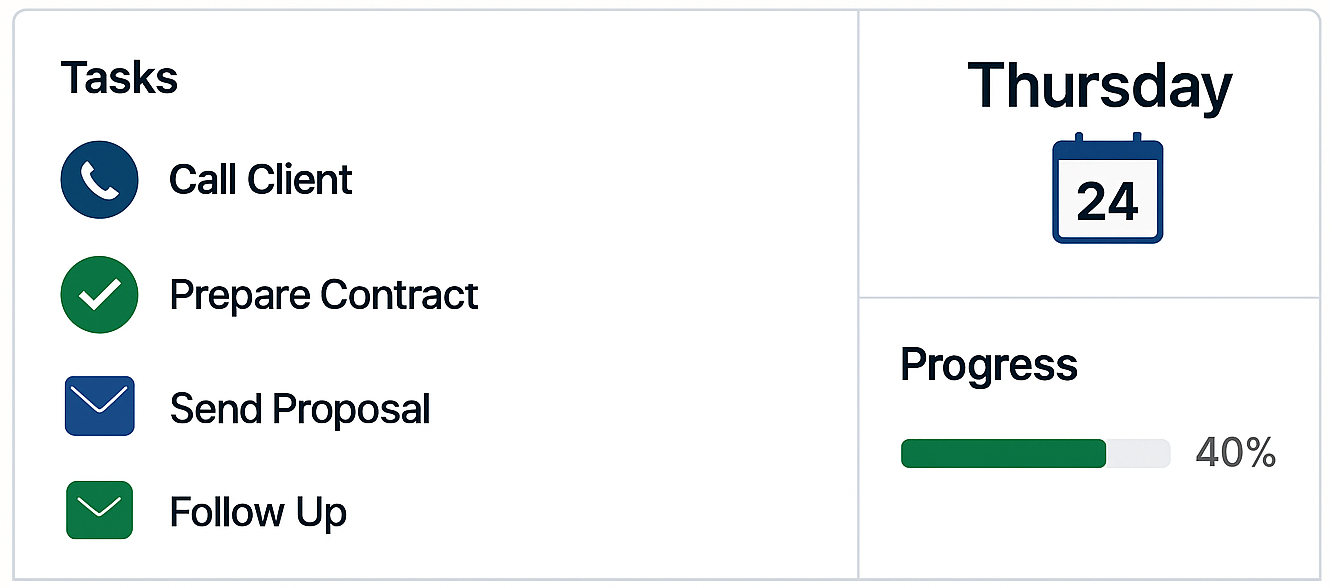
Pipedrive
July 25, 2025
Master Your Follow-ups: A Complete Guide to Pipedrive's Activity Dashboard
Following up consistently is the difference between closing deals and losing prospects to competitors. Yet many sales professionals struggle with the chaos of sticky notes, scattered reminders, and forgotten callbacks.
Introducing Pipedrive's Activity dashboard – your command center for turning follow-up chaos into a systematic, revenue-generating machine.
Why Activities Matter More Than You Think
Before diving into the mechanics, let's address the elephant in the room: many studies show that an average 80% of sales require five or more follow-up calls after the initial meeting, yet 44% of salespeople give up after just one follow-up. Pipedrive's Activity system ensures you're in that persistent 20% who actually close deals.
Your Daily Activity Ritual: The Morning Dashboard Check
Start every day the same way successful salespeople do – with a comprehensive review of your Activities dashboard. Here's your step-by-step morning routine:
Step 1: Navigate to Your Activity Dashboard
Log into Pipedrive and click on "Activities" in the main navigation. You'll land on the Activity dashboard, which serves as your daily command center. The default view shows today's activities, but you can adjust the date range using the calendar picker at the top.
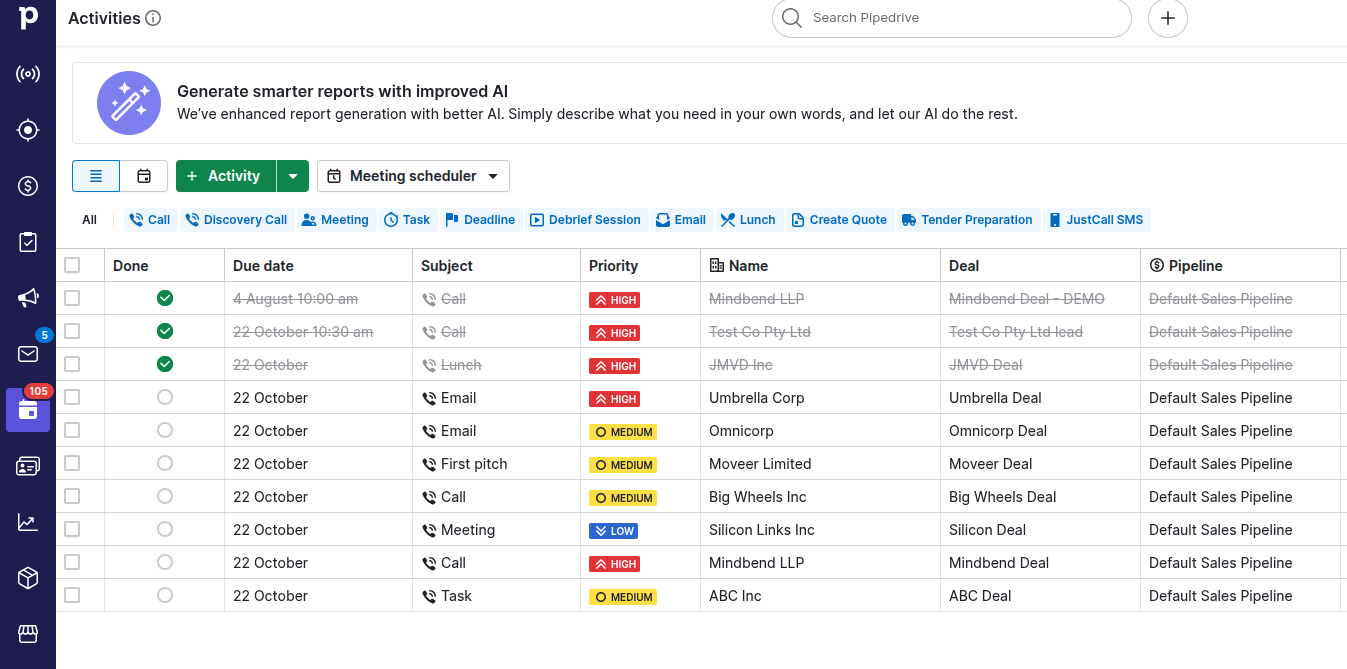
Step 2: Scan Your Due Activities
The Activities list displays all tasks scheduled for today, organized by time. Look for activities marked with different icons – phone calls, emails, meetings, and custom activity types. Pay special attention to overdue activities, which appear highlighted in red. These should be your first priority.
Step 3: Prioritize Your Action Items
Sort your activities by clicking the column headers. Most sales professionals find success prioritizing by deal value (if activities are linked to deals) or by contact importance. Pro tip: use the filter options to focus on specific activity types if your day requires concentrated calling or emailing sessions.
Executing Your Activities: From Planning to Action
Once you've reviewed your daily activities, it's time to execute. Here's how to handle each type of follow-up efficiently:
Making the Call or Sending the Email
Click on any activity to open its detail view. You'll see the contact information, deal context, and any notes from previous interactions. For phone activities, Pipedrive displays the contact's phone number prominently – click it to dial if you have calling integration enabled.
For email activities, click the email address to launch your default email client, or use Pipedrive's built-in email sync to send directly from the platform. The activity notes provide crucial context about what to discuss or mention in your outreach.
Capturing Interaction Details
During or immediately after each interaction, update the activity with relevant notes. Click "Add note" in the activity detail and record key information: the prospect's response, objections raised, next steps discussed, or any personal details that could help future conversations.
This documentation becomes invaluable for team handoffs and long-term relationship building. Future you (and your colleagues) will thank present you for thorough note-taking.
Completing Activities: The Art of Proper Follow-through
After completing an activity, you have two primary options that determine your follow-up success:
Option 1: Mark as Done
If the activity accomplished its goal and no immediate follow-up is needed, simply mark it as "Done." Click the checkmark icon next to the activity, and it will move to your completed activities list. This is appropriate for informational calls, document deliveries, or activities that naturally conclude a sales process phase.
Option 2: Create the Next Follow-up
More often, completing one activity should trigger the next step in your sales process. This is where Pipedrive's activity chaining becomes powerful. When marking an activity as complete, look for the "Schedule follow-up" option.
Click this to immediately create a new activity. Choose the appropriate activity type (call, email, meeting), set the due date based on your sales cadence, and add relevant notes about what should happen next. For example, if you just sent a proposal via email, your follow-up activity might be "Follow up on proposal - call in 3 days."
Advanced Activity Management Techniques
Adjusting Activity Settings
Go to Company Settings > Activities and set up rules for using activities. These include "Show schedule an activity popup" where you can specifying when a popup is shown (and what type of an activity is set) - for example after a deal is won. You can also set up custom activity types that fit the needs of your business.
Using Activity Automation
Pipedrive's workflow automation can create activities automatically based on deal stage changes or other triggers. For instance, when a deal moves to "Proposal Sent," an automated workflow can create a follow-up call activity for three days later. This reduces manual activity creation and ensures consistency across your team.
Leveraging Activity Insights
Regularly review your completed activities using Pipedrive's reporting features. Navigate to Insights to review activity reports to see patterns in your follow-up behaviour. Are you completing activities on time? Which activity types correlate with closed deals? This data helps refine your follow-up strategy over time.
Building Your Follow-up Cadence
Successful follow-up isn't random – it follows a strategic cadence. Here's a framework for building yours:
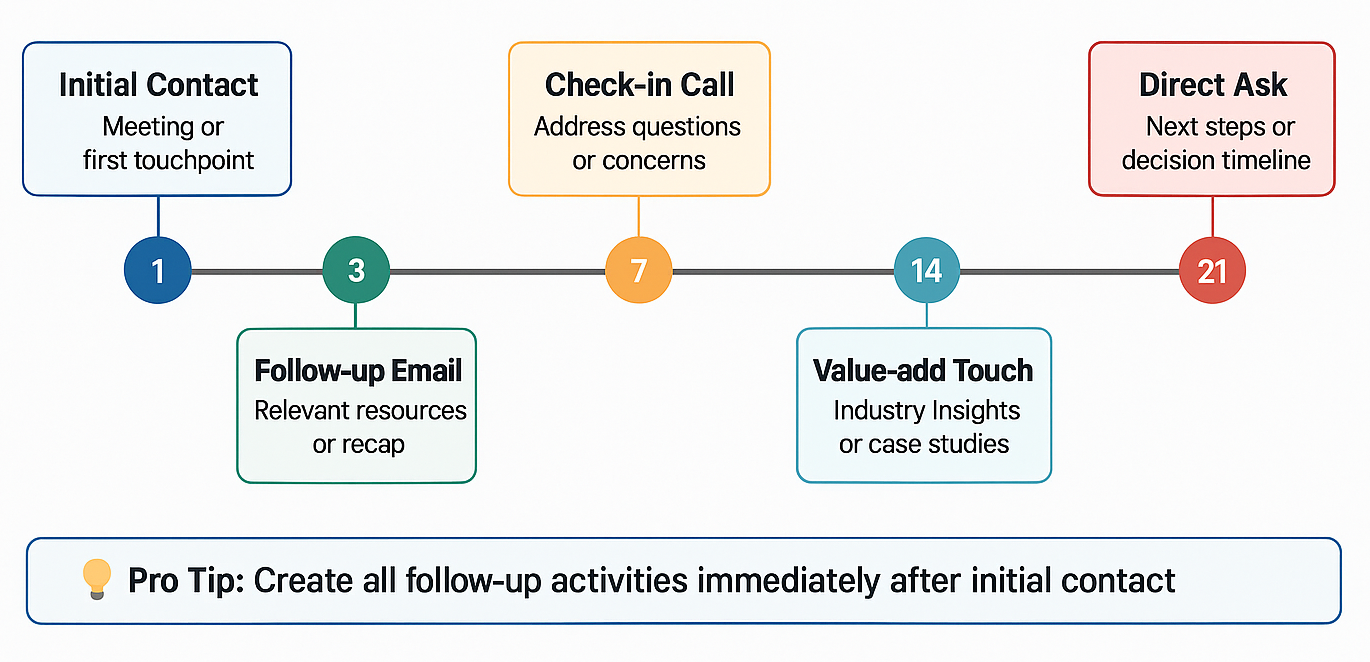
Day 1: Initial contact or meeting
Day 3: Follow-up email with relevant resources
Day 7: Check-in call to address questions
Day 14: Value-add touchpoint (industry insight, case study)
Day 21: Direct ask for next steps or decision timeline
Create activities for each touchpoint immediately after your initial contact. This proactive approach ensures prospects stay engaged throughout your sales cycle.
Common Pitfalls to Avoid
Even with Pipedrive's robust activity system, sales professionals make predictable mistakes:
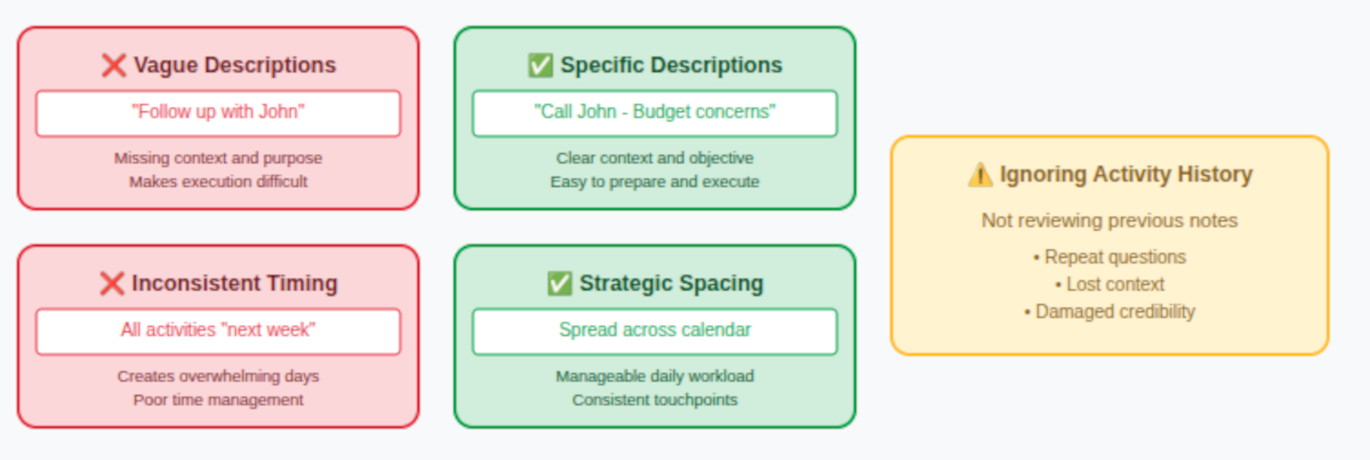
Vague Activity Descriptions: "Follow up with John" tells you nothing about context or purpose. Instead, write "Call John to discuss budget concerns raised during demo."
Inconsistent Due Dates: Setting all follow-ups for "next week" creates feast-or-famine workdays. Spread activities strategically across your calendar.
Ignoring Activity History: Before each follow-up, review previous activity notes. Nothing kills credibility faster than asking questions you've already discussed.
Making Activities Work for Your Team
If you manage a sales team, use Pipedrive's activity features for coaching and accountability:
- Review team activity completion rates weekly
- Create shared activity templates for consistent messaging
- Use activity reports to identify coaching opportunities
- Set up notifications for overdue activities to prevent follow-up gaps
Your Next Steps
Effective follow-up through Pipedrive's Activity dashboard isn't complicated, but it requires discipline and consistency. Start tomorrow morning with your activity review ritual, and commit to proper activity completion and follow-up creation for one week.
Track your results – you'll likely see improved response rates, shorter sales cycles, and fewer deals lost to poor follow-up. The prospects who seemed to disappear will start re-engaging, and your pipeline will become more predictable.
Remember: in sales, persistence pays, but only when it's systematic. Pipedrive's Activity dashboard gives you the system – now you just need to work it consistently. Your future closed deals depend on the follow-up discipline you build starting today.




